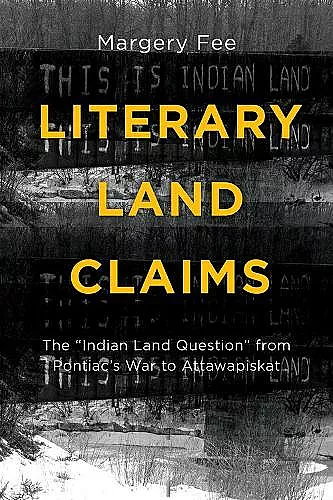Literary Land Claims
The ""Indian Land Question"" from Pontiac's War to Attawapiskat
Format:Paperback
Publisher:Wilfrid Laurier University Press
Published:30th Sep '15
Currently unavailable, our supplier has not provided us a restock date

Literature not only represents Canada as ""our home and native land"" but has been used as evidence of the civilization needed to claim and rule that land. Indigenous people have long been represented as roaming ""savages"" without land title and without literature. Literary Land Claims: From Pontiac's War to Attawapiskat analyzes works produced between 1832 and the late 1970s by writers who resisted these dominant notions.
Margery Fee examines John Richardson's novels about Pontiac's War and the War of 1812 that document the breaking of British promises to Indigenous nations. She provides a close reading of Louis Riel's addresses to the court at the end of his trial in 1885, showing that his vision for sharing the land derives from the Indigenous value of respect. Fee argues that both Grey Owl and E. Pauline Johnson's visions are obscured by challenges to their authenticity. Finally, she shows how storyteller Harry Robinson uses a contemporary Okanagan framework to explain how white refusal to share the land meant that Coyote himself had to make a deal with the King of England.
Fee concludes that despite support in social media for Theresa Spence's hunger strike, Idle No More, and the Indian Residential School Truth and Reconciliation Commission, the story about ""savage Indians"" and ""civilized Canadians"" and the latter group's superior claim to ""develop"" the lands and resources of Canada still circulates widely. If the land is to be respected and shared as it should be, literary studies needs a new critical narrative, one that engages with the ideas of Indigenous writers and intellectuals.
Fee contributes to the decolonization of literary studies in Canada and readers will benefit from Fee's contextualization of Indigenous notions of land rights and language. ... scholars interested in issues related to decolonization and Indigenous sovereignty will find this work especially useful. -- Lianne Leddy -- H-Envirnoment, 2016
Literary Land Claims is an extremely important contribution to conversations about literature in Canada. ... At a time when universities across Canada are endeavouring to heed the Truth and Reconciliation Commission's "Calls to Action," Fee points readers toward a goal of consensus building, one that is predicated on muddying the binary and hierarchical logics through which we have tended to understand identity and, indeed, colonialism itself. She opens up an engaging and necessary conversation, offering a model for rich, ethical scholarly engagement with a literary landscape that is extends far beyond this book, and beyond the confines of "Canlit." -- Sarah Krotz -- English Studies in Canada
... Literary Land Claims is timely reading. ... a rich and thoughtful book which will appeal to anyone writing or teaching in fields relating to settler-colonial, Canadian, and Indigenous studies. Historians in particular will find Fee's chapters a valuable complement to the original texts she discusses. -- Megan Harvey -- BC Studies, 2017
Fee's argument is a compelling reframing of Indigenous literatures and Canadian cultural nationalism. Her case that literature and storytelling are powerful decolonial tools arrives at a crucial time for Indigenous literature and theory as well as the Truth and Reconciliation Commission's calls to decolonize the academy and public school systems, both of which are bound up within Canada's literary canon. Thus, I wholeheartedly endorse Fee's text as an important addition to our decolonial theoretical toolkit. -- Joshua Whitehead -- ariel, 2018
- Winner of Finalist for the 2015 ACQL Gabrielle Roy Prize for Literary Criticism.
ISBN: 9781771121194
Dimensions: 229mm x 152mm x 25mm
Weight: 550g
326 pages